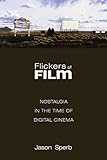Flickers of Film : Nostalgia in the Time of Digital Cinema / Jason Sperb.
Material type: TextPublisher: New Brunswick, NJ : Rutgers University Press, [2015]Copyright date: ©2015Description: 1 online resource (208 p.) : 24 photographsContent type:
TextPublisher: New Brunswick, NJ : Rutgers University Press, [2015]Copyright date: ©2015Description: 1 online resource (208 p.) : 24 photographsContent type: - 9780813576022
- 9780813576046
- 791.43/653 23
- PN1995.9.N67 S64 2016
- online - DeGruyter
| Item type | Current library | Call number | URL | Status | Notes | Barcode | |
|---|---|---|---|---|---|---|---|
 eBook
eBook
|
Biblioteca "Angelicum" Pont. Univ. S.Tommaso d'Aquino Nuvola online | online - DeGruyter (Browse shelf(Opens below)) | Online access | Not for loan (Accesso limitato) | Accesso per gli utenti autorizzati / Access for authorized users | (dgr)9780813576046 |
Browsing Biblioteca "Angelicum" Pont. Univ. S.Tommaso d'Aquino shelves, Shelving location: Nuvola online Close shelf browser (Hides shelf browser)

|

|

|

|

|

|

|
||
| online - DeGruyter Village of Immigrants : Latinos in an Emerging America / | online - DeGruyter Coming of Age in Jewish America : Bar and Bat Mitzvah Reinterpreted / | online - DeGruyter Writing America : Literary Landmarks from Walden Pond to Wounded Knee (A Reader's Companion) / | online - DeGruyter Flickers of Film : Nostalgia in the Time of Digital Cinema / | online - DeGruyter When Good Jobs Go Bad : Globalization, De-unionization, and Declining Job Quality in the North American Auto Industry / | online - DeGruyter Catching a Case : Inequality and Fear in New York City's Child Welfare System / | online - DeGruyter Gender Violence in Peace and War : States of Complicity / |
Frontmatter -- CONTENTS -- PREFACE -- ACKNOWLEDGMENTS -- Introduction: Self-Theorizing Nostalgia -- 1. I’ll (Always) Be Back: Virtual Performances; or, The Cinematic Logic of Late Capitalism -- 2. They Saw No Future: New Nostalgia Movies and Digital Exhibition -- 3. Digital Decasia: Preserving Film, Database Histories, and the Potential Value of Reflective Nostalgia -- 4. Going Home . . . for the First Time: Pixar Studios, Digital Animation, and the Limits of Reflective Nostalgia -- 5. TRON Legacies: Disney and Nostalgia Blockbusters in the Age of Transmedia Storytelling -- 6. Game (Not) Over: Video-Game Pastiche and Nostalgic Disavowals in the Postcinematic Era -- Conclusion: On Clouds and Be Kind Rewind -- Notes -- Selected Bibliography -- Index -- About the Author
restricted access online access with authorization star
http://purl.org/coar/access_right/c_16ec
Whether paying tribute to silent films in Hugo and The Artist or celebrating arcade games in Tron: Legacy and Wreck-It-Ralph, Hollywood suddenly seems to be experiencing a wave of intense nostalgia for outmoded technologies. To what extent is that a sincere lament for modes of artistic production that have nearly vanished in an all-digital era? And to what extent is it simply a cynical marketing ploy, built on the notion that nostalgia has always been one of Hollywood’s top-selling products? In Flickers of Film, Jason Sperb offers nuanced and unexpected answers to these questions, examining the benefits of certain types of film nostalgia, while also critiquing how Hollywood’s nostalgic representations of old technologies obscure important aspects of their histories. He interprets this affection for the prehistory and infancy of digital technologies in relation to an industry-wide anxiety about how the digital has grown to dominate Hollywood, pushing it into an uncertain creative and economic future. Yet he also suggests that Hollywood’s nostalgia for old technologies ignores the professionals who once employed them, as well as the labor opportunities that have been lost through the computerization and outsourcing of film industry jobs. Though it deals with nostalgia, Flickers of Film is strikingly cutting-edge, one of the first studies to critically examine Pixar’s role in the film industry, cinematic representations of videogames, and the economic effects of participatory culture. As he takes in everything from Terminator: Salvation to The Lego Movie, Sperb helps us see what’s distinct about this recent wave of self-aware nostalgic films—how Hollywood nostalgia today isn’t what it used to be.
Mode of access: Internet via World Wide Web.
In English.
Description based on online resource; title from PDF title page (publisher's Web site, viewed 03. Jan 2023)


